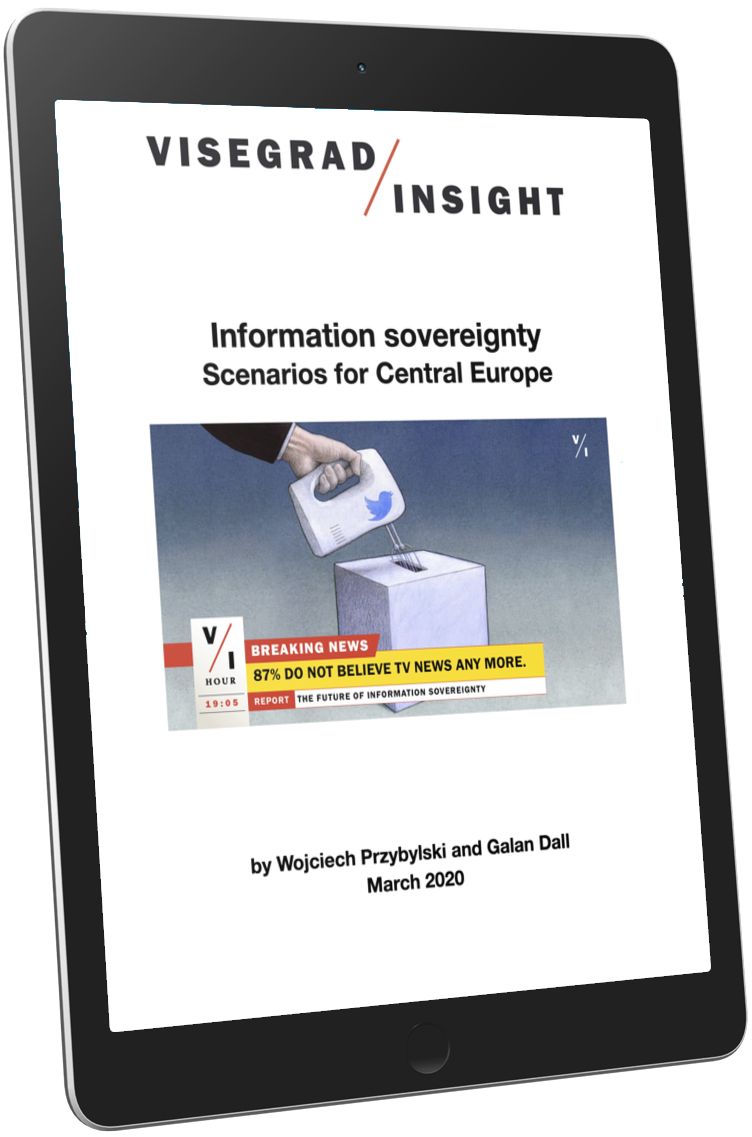Imagine that in five to ten years, Central Europe has become a lab for democracy and security in Europe. After decades of following the trail of development left behind by western democracies, the countries of the region abandon the “catching up” paradigm and are experimenting with tactics addressing today’s and tomorrow’s societal deficiencies
★★★★★
REPORT
Information Sovereignty: Scenarios for Central Europe
Executive summary
★★★★★
The issues they confront are not solely local threats, similar instances have offshoots across the globe, but many are more pronounced in Central Europe. Essentially, it is the societies’ very vulnerability – their relatively rapid shift in governmental styles and the lack of engrained (multi-generational) democratic ideology as well as associated security frameworks – which makes them the ideal location to experiment with new ideas. Some of these concepts could develop into powerful tools for the populaces while others could be exploited by malign actors – foreign or domestic – to the detriment of the society.
There is no one solution for all the problems facing our democracies – just as there is not one political party that has all the right answers – but there are a few fundamental principles which, if grasped, hold the potential to address many of the core issues facing us today.
Such is the case of information sovereignty – a political concept linking security and democracy – which is examined in this report.

In the following report, four scenarios arising from current trends and shifting variables in the fields of journalism, advertising and politics present useful snapshots for how the near future of Central European democracies may develop, and in doing so highlighting critical areas for policy-makers and the public at large to consider in order to prevent some of the more devastating outcomes.
In Centralisation of Media, the consequences of a near-total government takeover of the information sphere lead to the deterioration of the section as well as the country’s eventual political isolation from its allies resulting in an adverse security situation.
With Disruptive Decentralisation, a similar set of centralised media control as in the previous scenario, but here the model is unsustainable and leads to privatisation of the market. However, the viable options for commercial journalism prove to be too great for smaller, independent and locally focused media, which eventually are swallowed up by national outlets or dissolve. Here, the more rural public loses out and a deeper polarisation of society emerges.
In Growth of a Fragmented Sphere, governmental policies maintaining stable funding for pro-governmental media corrodes the advertising market and also heightens the polarisation between the outlets, irreversibly damaging the public sphere. Therefore, independent and corporate media turn away from ambitious news journalism. As public finances collapse not allowing for generous subsidies so does the effective propaganda machine leaving the media market overall more fragmented, rather than just decentralised.
As the region has developed the digital ads market at an even faster pace than other parts of Europe, it has not built up resilience to challenges that come with it. For years, organised crime has been utilising the security gaps in online advertising to make a tremendous profit, leading to A Collapse of the Advertising Market.
Policy recommendations:
- Protect multiple-stakeholder media environments to prevent media ownership monopoly.
- Build up the digital toolbox with advanced customer (audience) relations that would empower local journalism and media models and provide internships for local journalists and publishers in successful digital media in the region to build up their resilience-based on comparable experience.
- Monitor both communication and economic situation of small and medium media players as well as popular alternative social media influencers to improve national strategic communication resilience.
- Implement measures that prevent digital ad frauds, such as digital AI tools to monitor online traffic and initiate code of practice across media and advertising industries.
- Build up advanced disinformation themes analysis to anticipate future malign foreign influence themes and prepare relevant countermeasures.
- Create a media education institution in Central Europe to inspire, educate and build trust in journalism, a cornerstone of democracy. Think big and make an impact! For instance by moving Newseum – media education institute recently closed in the USA – to an attractive location in Central Europe.
—-
Authors:
Wojciech Przybylski – Wojciech Przybylski is the editor-in-chief of Visegrad Insight and chairman of Res Publica Foundation in Warsaw, a media think tank with a focus on civil society, innovation and security in Central and Eastern Europe. His expertise includes European foreign policy and political culture. Previously, he has been the editor-in-chief of Eurozine – a Vienna based magazine with a European network of cultural journals, and a Polish quarterly Res Publica Nowa. He leads the ‘New Europe 100’ network of successful digital age leaders from CEE across the fields of business, research media, NGO and public administration, and serves as a member of the advisory board of the European Forum of New Ideas and the European Digital Forum. Mr. Przybylski has been a lecturer at the Warsaw University, a guest lecturer at Pázmány Péter Catholic University in Budapest and a junior research fellow at CEFRES in Prague. He has been published in Project Syndicate, Foreign Policy, Politico Europe, Journal of Democracy, EUObserver, VoxEurop, Hospodarske noviny, Internazionale, Zeit, Dziennik Gazeta Prawna, Gazeta Wyborcza and others. Mr. Przybylski also co-authored a book ‘Understanding Central Europe’, Routledge 2017.
Twitter: @wprzybylski
Galan Dall – An editor and author currently living in the United Kingdom. Editor-at-large at the Visegrad Insight in Warsaw, Poland, the main Central European platform of debate and analysis that generates future policy recommendations for Europe and the transatlantic partners. He is originally from the United States and a graduate of the University of Wisconsin, Madison.
Download this report
– only for subscribers of the Visegrad Insight

